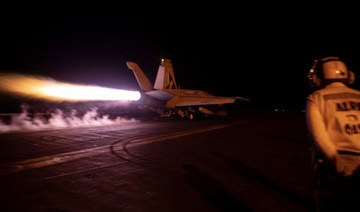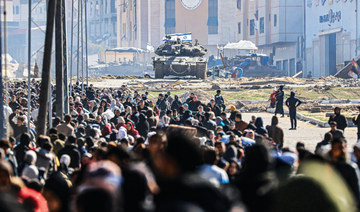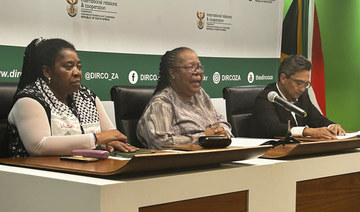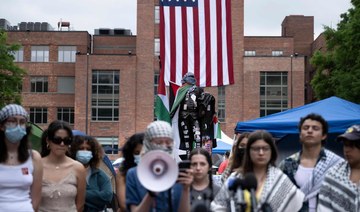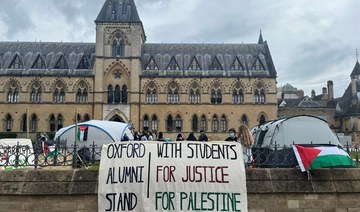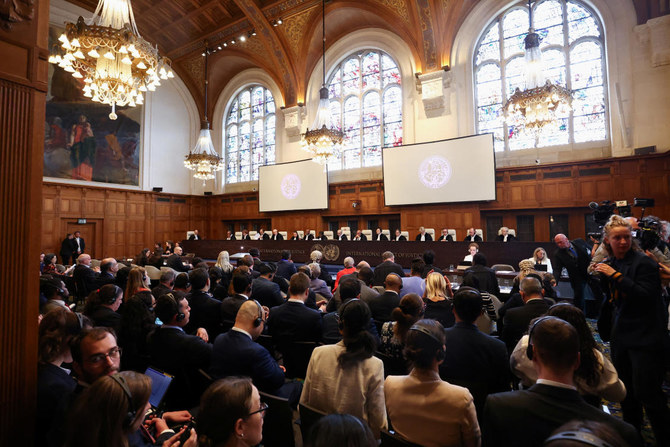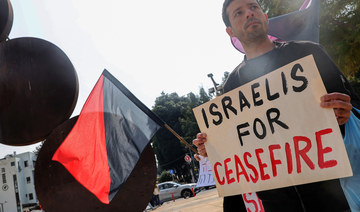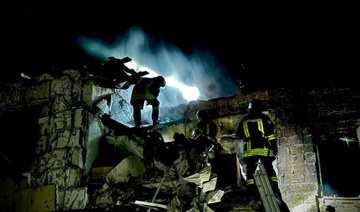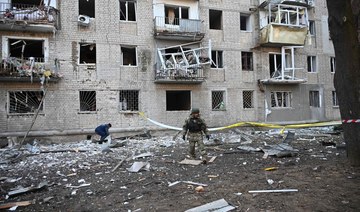LONDON: Thousands of pro-Palestinian demonstrators marched through the streets of London on Saturday to “condemn UK government actions” in the war on Gaza and call for an immediate ceasefire, organizers said.
“This is the eighth such march and comes in the wake of the interim ruling against Israel by the International Court of Justice on Jan. 26,” the UK-based Palestinian Solidarity Campaign told Arab News.
“Not only did the ICJ find South Africa’s case — that ‘Israel …. is engaging in … genocidal acts against the Palestinian people in Gaza’ — to be plausible, it also found evidence of the risk of further acts of genocide to be sufficient for the court to order interim measures to prevent such acts,” PSC added.
“Israel has destroyed most health care services and education facilities. Far from obeying the ICJ orders, Israel continues its attacks in what constitutes an attempt at ethnic cleansing of Palestinians from Gaza,” PSC also said.
On Dec. 29, South Africa filed an application instituting proceedings against Israel concerning alleged violations in the Gaza Strip, calling on the government to “immediately suspend its military operations” in the besieged Palestinian territory.
“The ICJ found it plausible that Israel’s acts could amount to genocide and issued six provisional measures, ordering Israel to take all measures within its power to prevent genocidal acts, including preventing and punishing incitement to genocide, ensuring aid and services reach Palestinians under siege in Gaza, and preserving evidence of crimes committed in Gaza,” the Office of the High Commissioner for Human Rights said on Wednesday.
Israel’s bombardment of the Gaza Strip since Oct. 7 has claimed the lives of more than 27,000 Palestinians, including more than 11,000 children, and wounded 66,452 others. Thousands more are missing or presumed dead, while almost all of Gaza’s population has been displaced.
The ICJ has ordered Israel and its military to stop killing Palestinians, punish incitement to genocide, enable emergency assistance and restore basic services to Gaza, and take steps to ensure that possible genocide does not continue.
“The UK government’s response to this ruling has been absolutely shameful, seeking to downplay its significance and urgency,” PSC said. “An immediate response should be to suspend UK arms exports to Israel but instead the government joined other nations in suspending funding to UNRWA, which plays a crucial role in providing essential services to Palestinian refugees in Gaza and elsewhere across the region. This is unconscionable in the context of a genocide.”
UNRWA, the UN Palestinian refugee agency, said on Thursday that it may have to stop operations in Gaza and the wider Middle East region by the end of the month if funding does not resume, after more than a dozen countries, including the US, Germany, Britain and Sweden, suspended funding over allegations that 12 staff members were involved in Hamas’ surprise attack on Israel ahead of the assault.
“Such a step by the UK government opens it to the charge of being in violation of its responsibilities, as a party to the Genocide Convention, to act to ensure it is not complicit in the commission of genocide. Cutting funding to UNRWA will undeniably increase the risk of irreparable harm to the people of Gaza,” PSC said.
Ben Jamal, PSC director, said: “Israel has been committing the gravest of crimes in Gaza — genocide. It has been brought before the International Court of Justice, which having assessed the substantial body of evidence provided by South Africa, found it to be credible.
“We have been marching and protesting in our hundreds of thousands for more than three months warning of exactly this — Israel’s actions demonstrate a genocidal intent ... How long will our political leaders continue to aid and provide cover for genocide?“
The protesters on Friday marched to Whitehall to send a message to Downing Street that “the UK must end its complicity in Israel’s genocide and demand a permanent ceasefire (which) must be the starting point to address the underlying causes, including Israeli military occupation and a system of oppression against the Palestinian people that is considered internationally to meet the legal definition of apartheid,” Jamal said.
The national march, which has been organized almost every Saturday for more than three months, was organized by a coalition including the Friends of Al-Aqsa, Palestinian Forum in Britain, Stop the War Coalition, Campaign for Nuclear Disarmament, Palestine Solidarity Campaign and Muslim Association of Britain.
London’s Metropolitan Police said that the “events passed peacefully with disruption kept to a minimum” and would “always seek to work with protest organizers” to ensure disorder is prevented.
“A small number of arrests were made, two for public order offenses, one for obstructing police and one after a smoke bomb/flare was set off,” Deputy Assistant Commissioner Matt Ward from the Met Police said in a statement on X.
Ismail Patel, the chair of Friends of Al-Aqsa, said: “The ICJ findings are a warning to the British government and opposition leader Keir Starmer (that) if they continue with their unequivocal support of Israel, they will be complicit to the crimes of genocide.”
He added: “The British government must immediately stop the sale of military hardware to Israel that is charged with the crimes of genocide.
“Further, we need to continue with our campaign of calling an end to the genocide in Gaza and demand that British politicians stop supporting Israel in its genocide.”














